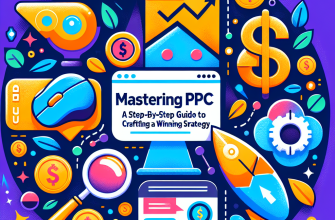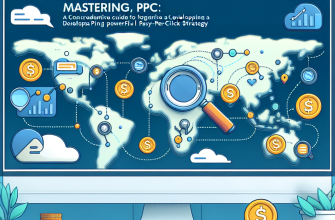- Mastering PPC: A Comprehensive Audit Guide to Boost Your Campaign Performance
- Why Conduct a PPC Audit?
- Step 1: Benchmark Your Current Performance
- Step 2: Analyze Account Structure
- Step 3: Review Keywords and Match Types
- Step 4: Evaluate Ad Copy and Creative
- Step 5: Scrutinize Landing Pages
- Step 6: Check Settings and Extensions
- Step 7: Analyze Competitor Landscape
- Step 8: Leverage Automation and AI
- Step 9: Implement Changes and Monitor Results
Mastering PPC: A Comprehensive Audit Guide to Boost Your Campaign Performance
As a digital marketing expert, I’ve seen firsthand the transformative power of a well-executed Pay-Per-Click (PPC) campaign. However, even the most meticulously planned PPC strategies can falter without regular audits and adjustments. Today, I’m here to share a comprehensive guide on conducting a PPC audit that will not only boost your campaign performance but also maximize your return on investment.
Why Conduct a PPC Audit?
Before diving into the how-to, it’s crucial to understand the why. A PPC audit is an in-depth review of your campaigns to identify areas that are underperforming, opportunities for optimization, and strategies that are working well. This process helps ensure that every dollar of your PPC spend is working as hard as possible towards achieving your marketing goals.
Step 1: Benchmark Your Current Performance
The first step in any audit is to establish your current performance benchmarks. This involves gathering data on all relevant metrics, such as click-through rates (CTR), cost per click (CPC), conversion rate, quality score, and overall return on ad spend (ROAS). These metrics will provide a clear picture of where your campaigns stand and help identify specific areas for improvement.
Step 2: Analyze Account Structure
A well-organized account structure is foundational to PPC success. Examine how your campaigns and ad groups are organized. Are they grouped logically? Does each campaign have a clear objective? Are your ad groups tightly themed? An optimal structure not only enhances your quality score but also improves the relevance of your ads to your target audience.
Step 3: Review Keywords and Match Types
Keywords are the linchpin of PPC campaigns. During your audit, review the keywords you are bidding on and their respective match types. Are there any underperforming keywords that are draining your budget? Conversely, are there high-performing keywords you could bid more aggressively on? Also, consider the balance between broad, phrase, and exact match types to optimize visibility and control.
Step 4: Evaluate Ad Copy and Creative
Your ad copy and creative elements are what actually engage users. Evaluate your current ads for relevance, clarity, and engagement. Are your ads compelling enough to earn clicks? Do they include strong calls-to-action? A/B testing different variations can uncover what resonates best with your audience and lead to higher conversion rates.
Step 5: Scrutinize Landing Pages
The effectiveness of your PPC campaigns doesn’t stop at the click. The user’s post-click experience on your landing pages is equally important. Review your landing pages for alignment with the corresponding ads in terms of content, design, and calls-to-action. Ensure that the landing pages are optimized for conversion, with fast load times and a mobile-friendly design.
Step 6: Check Settings and Extensions
Sometimes, the devil is in the details. During your audit, review all campaign settings to ensure they align with your goals. This includes targeting options, bid strategies, and ad scheduling. Additionally, make sure you are utilizing all relevant ad extensions, as they can significantly enhance your ad visibility and effectiveness.
Step 7: Analyze Competitor Landscape
Understanding your competitive landscape is crucial. Use tools like Google Ads’ Auction Insights to see how your performance stacks up against your competitors. This can provide valuable insights into bidding strategies and potential areas for differentiation.
Step 8: Leverage Automation and AI
Modern PPC platforms offer powerful automation and AI tools that can help optimize your campaigns. If you’re not already using these tools, your audit might reveal opportunities to implement smart bidding strategies, responsive ads, and more. These technologies can help manage large-scale campaigns efficiently, saving time and improving performance.
Step 9: Implement Changes and Monitor Results
After identifying areas for improvement, the next step is to implement changes. However, an audit isn’t a one-and-done activity. Continuous monitoring and tweaking are essential to adapt to changing market conditions and evolving business goals.
Conducting a comprehensive PPC audit is a critical exercise for any digital marketer looking to improve their campaign performance. By systematically reviewing and optimizing each component of your PPC campaigns, you can ensure that your marketing budget is effectively spent and your business goals are met.
Remember, the digital landscape is ever-evolving, and staying on top of your PPC game requires regular audits and adjustments. With the right approach and attention to detail, you can turn your PPC campaigns into a growth engine for your business.
By following this guide, you’ll be well on your way to mastering PPC and driving significant improvements in your campaign performance. Happy optimizing!

A seasoned digital marketing strategist with over 8 years of experience across various areas of digital marketing, including SEO, SMM, PPC, content marketing, and email marketing. Specializes in transforming B2B, B2C, e-commerce, and SaaS businesses by creating effective go-to-market strategies and building thriving digital ecosystems. Known for a data-driven approach to optimizing campaigns and maximizing results.
“If your business is looking to scale or in need of a fresh perspective, feel free to contact”.




